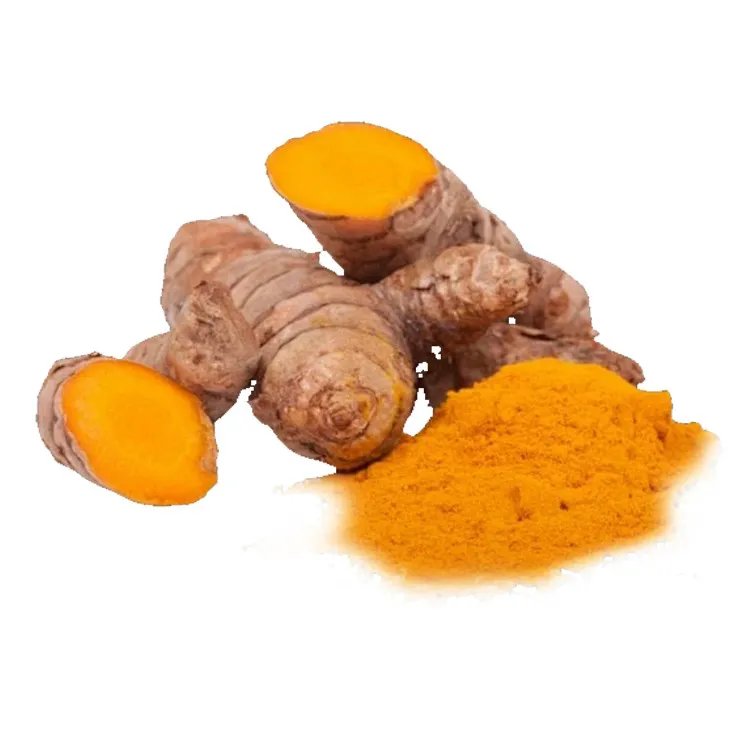- 0086-571-85302990
- sales@greenskybio.com
Curcumin in Reducing Belly Fat: A Scientific Overview
2025-05-30

In the quest for effective weight management strategies, researchers and health enthusiasts alike have shown interest in natural compounds that can support fat loss, particularly in the stubborn area around the abdomen. Among these compounds, Curcumin, the active ingredient found in the spice turmeric, has garnered significant attention due to its potential health benefits. This article delves into the scientific investigation of whether Curcumin can play a role in reducing belly fat.
Understanding Curcumin
Curcumin is a bioactive compound derived from the rhizome of the turmeric plant (Curcuma longa). It is renowned for its anti-inflammatory and antioxidant properties, which contribute to its broad spectrum of health benefits. Turmeric, often used in culinary traditions such as Indian cuisine, is not only a flavoring agent but also a traditional remedy for various ailments. Curcumin, with its distinct bright yellow color, has been the subject of extensive research not just for its health-promoting attributes, but also for its role in weight management.

Curcumin and Weight Loss: What Does Science Say?
Several studies have explored the impact of curcumin on weight loss, focusing on its ability to modulate metabolic pathways that could influence fat deposition, particularly in the belly area. One proposed mechanism by which curcumin aids in weight management is through its ability to enhance fat metabolism and subsequently increase the body's capacity to burn calories. It is postulated that curcumin may activate specific genes related to fat burning and inhibit those associated with fat storage.
Anti-inflammatory Benefits
One of the key pathways through which curcumin is thought to address belly fat is its anti-inflammatory action. Chronic inflammation is considered a factor contributing to obesity and associated metabolic disorders. Adipose tissue, or body fat, when in excess, can become a source of inflammatory cytokines, perpetuating a cycle of inflammation and further fat accumulation. Curcumin's ability to reduce inflammation may help mitigate this cycle, potentially leading to a reduction in visceral fat — the type of fat that surrounds organs in the abdominal cavity.
Impact on Insulin Sensitivity
Insulin resistance is another critical factor linked with the accumulation of belly fat. Curcumin's reported efficacy in improving insulin sensitivity can be instrumental in weight management. Improved insulin sensitivity leads to better glucose uptake by cells, reducing blood sugar levels and limiting the conversion of excess glucose into fat. Through this mechanism, curcumin may not only aid in reducing belly fat but also contribute to overall metabolic health.

Evidence from Studies
Recent studies offer promising insights into curcumin's potential role in weight management. A study published in the European Journal of Nutrition investigated the effects of curcumin supplementation on weight loss in overweight individuals. The findings indicated a significant reduction in body weight and waist circumference among participants who received curcumin supplements compared to the placebo group. While the results are encouraging, it is essential to note that such studies often involve controlled diets and exercise regimens, which can confound the outcomes attributed solely to curcumin.
Another study highlighted in the Journal of Nutrition & Metabolism examined curcumin's effect on obesity-related inflammation. It concluded that curcumin supplementation led to a decrease in pro-inflammatory markers in subjects, which was associated with a reduction in visceral fat. Such reductions in abdominal fat are particularly relevant given the association between belly fat and increased risk of cardiovascular diseases and diabetes.

Considerations and Future Directions
Despite the encouraging data, it is crucial to recognize that curcumin is not a standalone weight loss solution. Its effects are likely to be maximized when part of a comprehensive lifestyle approach that includes a balanced diet and regular physical activity. Moreover, curcumin's bioavailability is a significant concern, as it is not readily absorbed into the bloodstream. Research into formulations that enhance curcumin absorption — such as pairing it with Black Pepper Extract (piperine) — is ongoing, potentially paving the way for more effective applications.

Conclusion
In summary, while curcumin shows promise in supporting weight loss and reducing belly fat due to its anti-inflammatory and metabolic regulatory effects, it is essential to approach these findings with cautious optimism. More large-scale, long-term studies are necessary to fully understand the efficacy of curcumin in weight management and its mechanistic pathways. Integrating curcumin into a holistic approach to health, coupled with its other well-established benefits, offers a complementary strategy to combat obesity and improve metabolic health.
As research continues to evolve, curcumin's role in wellness and weight management will become clearer, potentially establishing it as a valuable tool in the global challenge of addressing obesity. For those considering curcumin supplementation, consulting healthcare professionals to tailor it to individual health needs remains a prudent course of action.
- ▶ Hesperidin
- ▶ citrus bioflavonoids
- ▶ plant extract
- ▶ lycopene
- ▶ Diosmin
- ▶ Grape seed extract
- ▶ Sea buckthorn Juice Powder
- ▶ Beetroot powder
- ▶ Hops Extract
- ▶ Artichoke Extract
- ▶ Reishi mushroom extract
- ▶ Astaxanthin
- ▶ Green Tea Extract
- ▶ Curcumin Extract
- ▶ Horse Chestnut Extract
- ▶ Other Problems
- ▶ Boswellia Serrata Extract
- ▶ Resveratrol Extract
- ▶ Marigold Extract
- ▶ Grape Leaf Extract
- ▶ blog3
- ▶ Aminolevulinic acid
- ▶ Cranberry Extract
- ▶ Red Yeast Rice
- ▶ Red Wine Extract
-
Cassia Seed Extract
2025-05-30
-
Buckthorn bark extract
2025-05-30
-
Mangosteen extract powder
2025-05-30
-
Phyllanthus Emblica Extract
2025-05-30
-
Mango flavored powder
2025-05-30
-
Nutmeg Extract
2025-05-30
-
Pueraria Lobata Extract
2025-05-30
-
Uridine-5'-monophosphate Disodium salt
2025-05-30
-
Chaste Berry Extract
2025-05-30
-
Sophora Japonica Flower Extract
2025-05-30





















